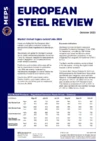Tata Steel UK's EAF plan aims to ‘reverse losses’
Tata Steel will close its two Port Talbot blast furnaces this year as part of a transition to EAF-based green steel production which aims to “reverse more than a decade of losses”, the company said.
A statement issued by the Indian-owned steelmaker today (January 19) confirmed the plan, which is expected to reduce Tata Steel UK’s CO2 emissions by five million tonnes per year but will potentially lead to 2,800 job losses in South Wales.
If plans to transition British Steel’s Scunthorpe plant to EAF production go ahead, Tata’s transition would leave the UK as one of only two G20 economies with no ability to produce virgin steel. The Tata development of a scrap-based EAF in Port Talbot would be completed in 2027.
Imported semi-finished steel
Tata intends to keep its existing Port Talbot hot rolling mill in operation. This, and its downstream and steel processing centres, will utilise imported semi-finished steel from the company’s plants in the Netherlands and India as well as “other select strategic suppliers”, it said.
In December, the UK Government announced plans to introduce a carbon border adjustment mechanism (CBAM) by 2027, which will levy tariffs on imported steel based on its embedded emissions.
MEPS International steel market analyst Jonathon Carruthers-Green explained the challenges faced by a UK steel industry attempting to reduce its emissions. He said: "It is a difficult time for the steel industry, it must adapt to the new reality of increased demand for low-emission steel. The European Union is currently trialling CBAM, which applies a surcharge tied to CO2 emissions. The UK is set to introduce a similar scheme from 2027. This means that, over time, steel produced in blast furnaces, like those at Port Talbot, will become increasingly uncompetitive.
"The country produces close to 10 million tonnes of scrap steel each year, with the majority of this currently being exported. This means there should be adequate scrap to supply a new EAF. This approach does have its drawbacks; the limitations of this technology mean we will be able to produce fewer key steel grades in the UK, ultimately increasing our reliance on imports. There really are no easy solutions."
The United Kingdom’s prime minister, Rishi Sunak, this week insisted that the UK remained “absolutely committed to steelmaking in the UK” as the country bids to achieve carbon net zero status by 2050.
The UK government has agreed a £500m package to support the £1.7bn investment needed to realise Tata’s planned transition to lower-emissions EAF-based steelmaking at Port Talbot.
Sunak said that the alternative to this plan would have been the closure of the “entire plant”, which would have resulted in around 8,000 job losses.
Tata engaged in discussions with the UK Steel Committee (a multi-trade union representative body) and its advisors before deciding on the details of its Port Talbot plan. The committee had proposed maintaining a single blast furnace to maintain steel production during the development of two new EAFs.
However, Tata concluded that continued blast furnace production while constructing the new EAF was financially inviable. It added that building the EAF in an already operating steel melt shop would be fraught with risk and would create a “sub-optimal plant layout”.
Port Talbot’s two blast furnaces and coke ovens will now be decommissioned in a phased manner with the first blast furnace closing around mid-2024. The remaining heavy-end assets will wind down during the second half of 2024.
Tata’s restructuring proposal also includes the intended closure of the Continuous Annealing Processing Line (CAPL) in March 2025.
EAF plan 'the right one'
Today’s statement revealed that Tata will endeavour to maximise voluntary redundancies. It plans to commit over £130m to a support package for affected employees. An additional £100m has been pledged by the UK and Welsh governments.
Tata Steel’s chief executive officer and managing director, T V Narendran, said that the steelmaker recognised that its plans would have a “major impact on the individuals and communities concerned”, but added that the business believed its plan was “the right one”.
“Having invested almost £5bn in the UK business since 2007, we must transform at pace to build a sustainable business in the UK for the long-term” he added.
“Our ambitious plan includes the largest capital expenditure in UK steel production in more than a decade, guaranteeing long-term, high-quality steel production in the UK and transforming the Port Talbot facility into one of Europe’s premier centres for green steelmaking.”

Source:
European Steel Review
The MEPS European Steel Review is an informative, concise and easy-to-use monthly publication, offering unique professional insight into European carbon steel prices.
Go to productRequest a free publication





